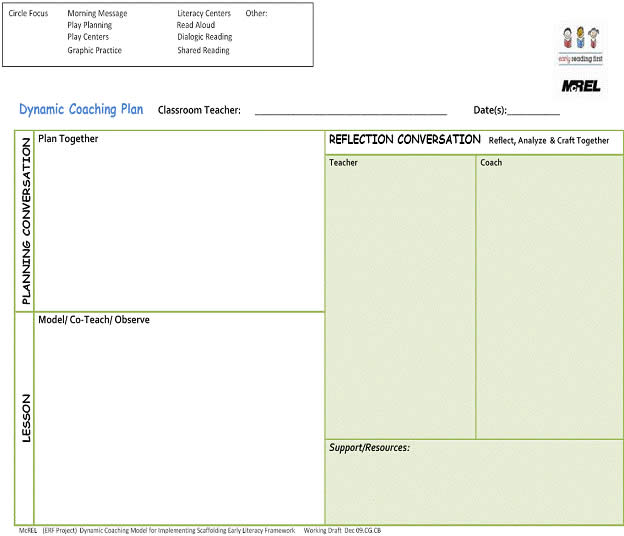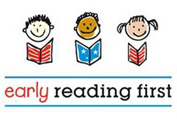Dynamic Coaching Framework
Parent Coaches
 The Dynamic Coaching Framework
The Dynamic Coaching Framework
Using expert coaching (outside and inside “experts”) and helping staff to become good coaches are integral parts of SEL professional development. Dynamic Coaching is both the framework for embedding professional development and a mechanism to cultivate comprehensive change.
McREL’s Dynamic Coaching Model
- Is inherently flexible
- Provides a spectrum of support to meet the needs of each site’s coaching staff and leadership team
- Mirrors the instructional principles of Scaffolding Early Learning (SEL)
Developed specifically for SEL
The Dynamic Coaching Model takes a Vygotskian approach to coaching, applying Vygotsky’s theory of development to adult learners. The teacher-coach relationship mirrors the teacher-child relationship where the coach’s role is to understand a teacher’s Zone of Proximal Development and to use mediators (e.g., language, shared activities) to scaffold learning in ways that facilitate high-level learning.
Integrated professional development
SEL professional development for coaches focuses on developing coaching skills—both content and process—while helping build support for systemic change. McREL’s extensive work in system improvement and leadership provides the framework for creating administrative and peer support for teachers’ professional growth and for building internal capacity to sustain the changes initiated by the ERF project.
A wide spectrum of support
The spectrum of coaching support varies depending on staff needs. For ERF projects, the Dynamic Coaching professional development helps individuals build foundational knowledge of coaching skills in addition to addressing the change process and managing transitions. At this beginning level, coaches are introduced to the following:
- Roles of a coach
- Use of the coaching cycle
- Ways to establish a coaching schedule
- Use of communication tools (e.g., coaching talk moves)
- Techniques for building trust with teachers
- Guidance on how teachers can consolidate their knowledge of SEL components and use assessment to inform instruction
- Approaches that facilitate reflective practice in teachers
The Dynamic Coaching Model professional development also helps sites develop peer coaching models to provide additional support. In addition, professional development for coaches includes the coaching cycle and planning tools to address key process elements, including guidance, strategies, and tools for understanding the nuances of human responses to change, facilitating reflective practice, supporting teacher individual needs, and hosting challenging conversations.


For further research
Cicchinelli, L., Dean, C., Galvin, M., Goodwin, B., Parsley, D. (2006). Success in sight: A comprehensive approach to school improvement. Denver, CO: Mid-continent Research for Education and Learning (McREL).
Marzano, R. J. (2000). A new era of school reform: Going where the research takes us. Aurora, CO: Mid-continent Research for Education and Learning.
Marzano, R. J., Waters, T., & McNulty, B. A. (2005). School leadership that works: From research to results. Alexandria, VA: Association for Supervision and Curriculum Development
Mid-continent Research for Education and Learning. (2000). Asking the right questions: A leader's guide to systems thinking about school improvement. Aurora, CO: Author.
Mid-continent Research for Education and Learning (McREL). (2001). Leadership for school improvement (rev. ed.). Aurora, CO: Author.
Miller, K. (2003). School, teacher, and leadership impacts on student achievement [policy brief]. Aurora, CO: Mid-continent Research for Education and Learning.
Parsley, D. & Galvin, M. (Winter 2008). Think systemically, act systematically. The American Association of School Administrators Journal of Scholarship & Practice (4)4, p. 4N10.
Waters, J. T., Marzano, R. J., & McNulty, B. A. (2003). Balanced leadership: What 30 years of research tells us about the effect of leadership on student achievement. Aurora, CO: Mid-continent Research for Education and Learning.
Parent Coaches
Parents are the first teachers children have and are the teachers they have for the longest time. As part of the SEL approach in ERF projects, parent coaches are designated at each site to help families learn to use program materials and model best practices during monthly home visits and parent-staff meetings at the schools. The parent coaches coordinate with the Reading First family liaisons and the Head Start Parent Council on outreach activities.
- Parents are invited to school to share artifacts, hobbies, to read to the children, and to tell about their work when these topics relate to what students are learning .
- Schools should provide opportunities for parents to observe their child’s class, take part during small-group instruction, and assist with managing small groups that are working independently while the teacher works with another group.
- Parent nights are invaluable opportunities to aid parents in working with their child to increase language and literacy at home. Parents are trained in effective strategies, such as dialogic reading that focuses on asking “who,” “what,” and “when” questions; following children’s answers with questions; repeating their child’s answers; providing assistance as necessary; praising and encouraging; and following their child’s interests.
Parent Coach Roles and Responsibilities
Role |
Responsibility and Suggested activities |
Frequency |
Bridge and Mentor |
Family Needs Survey
|
Beginning and Mid-Year |
Family Newsletter
|
Monthly |
|
Learner |
Participate in Scaffolding Early Learning Professional Development Sessions
|
Monthly |
Self-instruction
|
Ongoing |
|
Learning Facilitator & Resource Provider |
Home-school outreach activities
|
One–two days per week |
Take-home book program
|
One–two days per week |
|
Help child/family build or add to a home library
|
Ongoing |
|
Help families learn to use materials
|
Ongoing |
|
Home visits
|
Twice per year |
|
Parent-staff meetings at the schools
|
Monthly |

